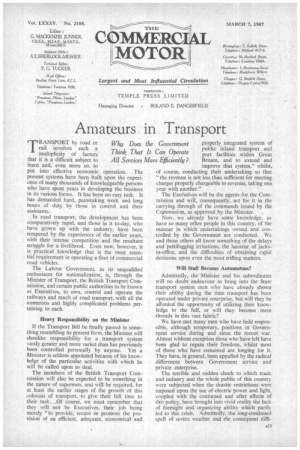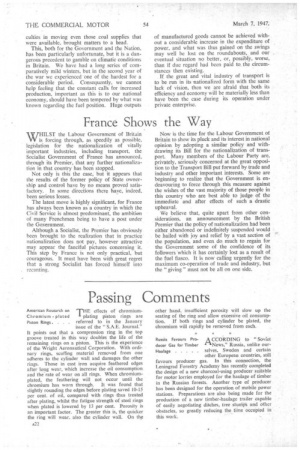Amateurs in Transport
Page 23

Page 24

If you've noticed an error in this article please click here to report it so we can fix it.
TRANSPORT by road or rail involves such a Why Does the Government multiplicity of factors. Think That It Can Operate that it is a difficult subject to All Services More Efficiently? learn and, even more so, to put into effective economic operation. The present systems have been built upon the experience of many thousands of knowledgeable persons who have spent years in developing the business in its various forms. It has been no easy task. It has demanded hard, painstaking work and long hours of duty by those in control and their assistants.
In road transport, the development has been comparatively rapid, and those in it to-day, who have grown up with the industry, have been tempered by the experiences of the earlier years, with their intense competition and the resultant struggle for a livelihood. Even now, however, it is practical knowledge that is the most essential requirement in operating a fleet of commercial road vehicles.
The Labour Government, in its unqualified enthusiasm for nationalization, is, through the Minister of Transport, the British Transport Commission, and certain public authorities to be known as Executives, to own, control and operate the railways and much of road transport, with all the numerous and highly complicated problems pertaining to each.
Heavy Responsibility on the Minister If the Transport Bill be finally passed in something resembling its present form, the Minister will shoulder responsibility for a transport system vastly greater and more varied than has previously been controlled personally by anyone. Yet a Minister is seldom appointed because of his knowledge of the particular activities with which he will be called upon to deal.
The members of the British Transport Commission will also be expected to be something in the nature of supermen, and will be required, for at least the earlier stages of the growth of this colossus of transport, to give their full time to their task. Of course, we must remember that they will not be Executives, their job being merely "to provide, secure or promote the provision of an efficient. adequate, economicaland properly integrated system of public inland transport and port facilities within Great Britain, and to extend and improve that system," whilst, of course, conducting their undertaking so that -"the revenue is not less than sufficient for meeting charges properly chargeable to revenue, taking one year with another."
The Executives will be the agents for the Commission and will, consequently, act for it in the carrying through of the commands issued by the Ccvnmission, as approved by the Minister. .
Now, we already have some knowledge, as have so many other people in this country, of the manner in which undertakings owned and controlled by the Government are conducted. We and those others all know something of the delays and pettifogging irritations, the hauteur of jacksin-office, and the difficulties of obtaining rapid decisions upon even the most trifling matters.
Will Staff Become Automatons?
Admittedly, the Minister and his subordinates will no doubt endeavour to bring into the State transport system men who have already shown their ability during the time transport has been operated under private enterprise, but will they be afforded the opportunity of utilizing their knowledge to the full, or will they become mere threads in this vast fabric?
We have met many men who have held responsible, although temporary, positions in Governwent service during and since the recent war. Almost without exception those who have left have been glad to regain their freedom, whilst most of those who have remained are longing for it. They have, in general, been appalled by the radical differences between Government service and private enterprise.
The terrible and sudden shock to which trade and industry and the whole public of this country were subjected when the drastic restrictions were imposed upon the use of electric -power and light. • coupled with the continued and after effects of this policy, have brought into vivid reality the lack of foresight and organizing ability which partly led to this crisis. Admittedly, the long-continued spell of severe weather and the consequent diffi culties in moving even those coal supplies that were available, brought matters to a head.
This, both for the Government and the Nation, has been particularly unfortunate, but it is a dangerous precedent to gamble on climatic conditions in Britain. We have had a long series of comparatively mild winters, but in the second year of the war we experienced 'one of the hardest for a considerable period. Consequently, we cannot help feeling that the constant calls for increased production, important as this is to our national economy, should have been tempered by what was known regarding the fuel position. Huge outputs of manufactured goods cannot be achieved without a considerable increase in the expenditure of power, and what was thus gained on the swings may well be lost on the roundabouts, and our eventual situation no better, or, possibly, worse, than if due regard had been paid to the circumstances then existing.
If the great and vital industry of transport is to be run in its nationalized form with the same lack of vision, then we are afraid that both its efficiency and economy will be materially less than have been the case during its operation under private enterprise.












































































